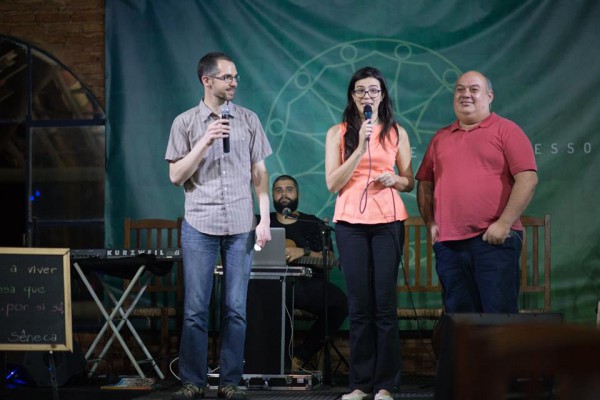To church plant, or to grow? For some churches, this is a critical question for missional discernment. As God grows our community, should we respond by building more infrastructure in the congregation to support new members—additional worship services, more programs, etc.—or should we send a portion of our members off to start a new church, to participate in God’s mission in a fresh way in some new place? Sometimes the answer is both.
On a recent trip to Brazil through Pittsburgh Theological Seminary’s World Mission Initiative, we visited the First Independent Presbyterian Church of São José do Rio Preto. Their pastor, Mario Sergio de Góis, told us that their three values are to be missional, multi-cultural, and multiplying. The last value, multiplication, reflects a commitment not just to growing their own congregation, but to multiplying the number of worshiping communities in their city.
This is evident in the latest new church to grow out of First IPI Rio Preto: On the evening of Sunday March 6, we worshiped with Vitral, a new church. Their name means Mosaic, and is intended to communicate the beautiful picture that’s created when God’s diverse people come together in worship. Our guide for the evening, Marianna, was a new member of the community who doesn’t yet identify as a Christian. Her voice brimmed with enthusiasm as she told us how she had once felt lonely and isolated, but after meeting Vitral’s pastor, Evandro, she had discovered a new joy in community.
The same enthusiasm seemed contagious as we participated in Vitral’s Sunday evening worship service. Everything about it seemed designed to create a hospitable environment for people who may be new to Church. This congregation was eager to engage constructively with the culture of its not-yet-Christian friends. The music blended both praise songs and secular songs. Evandro’s sermon quoted both Christian voices and voices from other religious traditions. An undercurrent of celebration ran through everything that happened in our fellowship and worship that night.
This sense of joy, energy, and hope came not just from encountering something new, but from sensing that God was active and present, that the Spirit was hovering over the creation of this new community of faith and stirring things up just as he had at the beginning of our universe. The community seemed elated to be discovering what God was doing in their midst.
The next day, Mario told us how his congregation had grown and added new services, each with different styles of music to allow people to worship in ways that felt natural. Before their contemporary service, he mentioned to our group that so many of the faces in that worship service were new that they felt like a new church to him.
But Mario didn’t want to just see his church grow. He encouraged the planting of Vitral because he knows that God works in different ways among different people. The northeast zone of their city didn’t need to be recruited to come to First Presbyterian Church for worship—they needed their own new worshiping community to connect with their unique culture. Hence the formation of Vitral.
Later in the day, Mario pointed to another staff member and said, “There’s our next church planter.” This suggests to me that their church was both growing and planting other congregations because they freely gave encouragement and permission to try new things. To create such cultures, senior leaders have to be free of pride or desire to control. A church should never seek to grow or plant because of a leader’s ego or desire to expand a congregation’s influence. But when a church genuinely wants to invite new people to worship and follow Jesus Christ, they might find themselves both growing internally and planting other churches. After all, while one plants and another waters, it’s God who gives the growth (1 Corinthians 3:7).
The Rev. Christopher Brown moved to Pittsburgh from Colorado to pursue a master of divinity (MDiv) degree at Pittsburgh Theological Seminary. He currently serves as the coordinator of the Church Planting initiative at the Seminary along with pursuing his master’s in sacred theology. Chris is the organizing co-pastor of The Upper Room Presbyterian Church, a church plant of the PC (U.S.A.) in Pittsburgh’s Squirrel Hill neighborhood. Chris regularly blogs at https://christopherbrown.wordpress.com and tweets at @brwnchrstpher.

